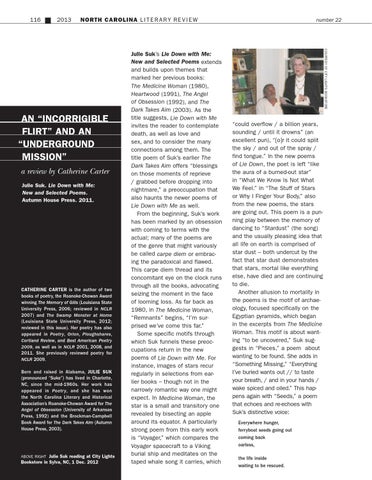116
2013
NORTH CAROLINA L I T E R A R Y RE V I E W
a review by Catherine Carter Julie Suk. Lie Down with Me: New and Selected Poems. Autumn House Press. 2011.
Catherine Carter is the author of two books of poetry, the Roanoke-Chowan Award winning The Memory of Gills (Louisiana State University Press, 2006; reviewed in NCLR 2007) and The Swamp Monster at Home (Louisiana State University Press, 2012; reviewed in this issue). Her poetry has also appeared in Poetry, Orion, Ploughshares, Cortland Review, and Best American Poetry 2009, as well as in NCLR 2001, 2008, and 2011. She previously reviewed poetry for NCLR 2009. Born and raised in Alabama, Julie Suk (pronounced “Suke”) has lived in Charlotte, NC, since the mid-1960s. Her work has appeared in Poetry, and she has won the North Carolina Literary and Historical Association’s Roanoke-Chowan Award for The Angel of Obsession (University of Arkansas Press, 1992) and the Brockman-Campbell Book Award for The Dark Takes Aim (Autumn House Press, 2003).
ABOVE RIGHT Julie Suk reading at City Lights Bookstore in Sylva, NC, 1 Dec. 2012
courtesy of City Lights Bookstore
An “Incorrigible Flirt” and AN “Underground Mission”
Julie Suk’s Lie Down with Me: New and Selected Poems extends and builds upon themes that marked her previous books: The Medicine Woman (1980), Heartwood (1991), The Angel of Obsession (1992), and The Dark Takes Aim (2003). As the title suggests, Lie Down with Me invites the reader to contemplate death, as well as love and sex, and to consider the many connections among them. The title poem of Suk’s earlier The Dark Takes Aim offers “blessings on those moments of reprieve / grabbed before dropping into nightmare,” a preoccupation that also haunts the newer poems of Lie Down with Me as well. From the beginning, Suk’s work has been marked by an obsession with coming to terms with the actual; many of the poems are of the genre that might variously be called carpe diem or embracing the paradoxical and flawed. This carpe diem thread and its concomitant eye on the clock runs through all the books, advocating seizing the moment in the face of looming loss. As far back as 1980, in The Medicine Woman, “Remnants” begins, “I’m surprised we’ve come this far.” Some specific motifs through which Suk funnels these preoccupations return in the new poems of Lie Down with Me. For instance, images of stars recur regularly in selections from earlier books – though not in the narrowly romantic way one might expect. In Medicine Woman, the star is a small and transitory one revealed by bisecting an apple around its equator. A particularly strong poem from this early work is “Voyager,” which compares the Voyager spacecraft to a Viking burial ship and meditates on the taped whale song it carries, which
number 22
“could overflow / a billion years, sounding / until it drowns” (an excellent pun), “[o]r it could split the sky / and out of the spray / find tongue.” In the new poems of Lie Down, the poet is left “like the aura of a burned-out star” in “What We Know Is Not What We Feel.” In “The Stuff of Stars or Why I Finger Your Body,” also from the new poems, the stars are going out. This poem is a punning play between the memory of dancing to “Stardust” (the song) and the usually pleasing idea that all life on earth is comprised of star dust – both undercut by the fact that star dust demonstrates that stars, mortal like everything else, have died and are continuing to die. Another allusion to mortality in the poems is the motif of archaeology, focused specifically on the Egyptian pyramids, which began in the excerpts from The Medicine Woman. This motif is about wanting “to be uncovered,” Suk suggests in “Pieces,” a poem about wanting to be found. She adds in “Something Missing,” “Everything I’ve buried wants out // to taste your breath, / and in your hands / wake spiced and oiled.” This happens again with “Seeds,” a poem that echoes and re-echoes with Suk’s distinctive voice: Everywhere hunger, ferryboat seeds going out coming back oarless, the life inside waiting to be rescued.
